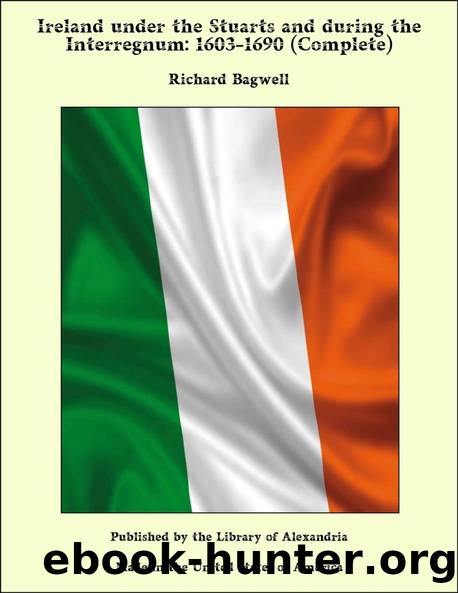Ireland under the Stuarts and During the Interregnum, Vol. 2 (of 3), 1642-1660 by Richard Bagwell

Author:Richard Bagwell [Bagwell, Richard]
Language: eng
Format: epub
Tags: Nonfiction, Religion & Spirituality, New Age, History, Fiction & Literature
ISBN: 9781465617170
Barnesnoble:
Publisher: Library of Alexandria
Published: 2021-02-24T05:00:00+00:00
Dundalk and Trim abandoned
Carlingford, Newry, Lisburn, and Belfast taken.
Coleraine taken.
Death of OâNeill, Nov. 6.
His last letter to Ormonde.
His character.
Ormonde had given directions to burn and abandon Dundalk and Trim, but the garrisons fled in too great haste, leaving their guns behind them. Having secured these important places Cromwell sent Venables to join Coote, while he turned his own steps southwards. Carlingford, which contained the largest magazine in Ulster, capitulated after some well-directed shots had been fired at Captain Fernâs frigate; seven cannon and a thousand muskets, with much powder and many pikes, fell into the victorâs hands. Newry also surrendered on articles. At Lisburn, Trevor with his cavalry surprised Venablesâ camp by night and very nearly gained a complete victory, but the trained soldiers soon recovered from their panic, and re-formed in a position where horsemen could not reach them. Trevor had to fall back as far as the Bann, and Belfast capitulated soon afterwards, leaving guns and powder to the enemy. A large number of the Scotch inhabitants were driven out. Coote made himself master of Coleraine, and by the end of November Ormonde reported that Carrickfergus, Charlemont, and Enniskillen were the only considerable Ulster garrisons still in Royalist hands. Before that time Owen Roe OâNeill had died at Cloughoughter, in Cavan. In the previous May he had likened Ormonde to Baal, and rejoiced that he was one of those who had not bowed the knee; but he saw clearly that it would be necessary to join either the Kingâs or the Parliamentâs party, though opposed to both, unless help came from abroad. He was driven to extremity, and could not otherwise support his army, which he regarded as the last hope of Ireland. It was with this object that he had dealings with Coote, Monck, and Jones, and was driven finally to unite with Ormonde, to whom he wrote only five days before his death. âBeing now in my death-bed,â he wrote, âI call my Saviour to witness that, as I hope for salvation, my resolution, ways, and intentions from first to last of these unhappy wars tended to no particular ambition or private interest of my own, notwithstanding what was or may be thought to the contrary, but truly and sincerely to the preservation of my religion, the advancement of his Majestyâs service, and just liberties of this nation, whereof, and of my particular reality and willingness to serve your Excellency (above any other in this kingdom), I hope that God will permit me to give ample and sufficient testimony in the view of the world ere it be long.â He concludes by recommending his son Henry to Ormondeâs care. As a soldier all accounts agree in praising OâNeill, whose word was always kept, and who is not charged with any acts of cruelty or unnecessary severity. Of his patriotism there can be no doubt, but of Ireland as a separate nation he seems to have had no definite idea. He was a Royalist, and his natural leaning would have been towards Ormonde as the special representative of the Crown.
Download
This site does not store any files on its server. We only index and link to content provided by other sites. Please contact the content providers to delete copyright contents if any and email us, we'll remove relevant links or contents immediately.
Room 212 by Kate Stewart(5105)
The Crown by Robert Lacey(4807)
Endurance: Shackleton's Incredible Voyage by Alfred Lansing(4769)
The Iron Duke by The Iron Duke(4349)
The Rape of Nanking by Iris Chang(4203)
Joan of Arc by Mary Gordon(4101)
Killing England by Bill O'Reilly(3996)
Say Nothing by Patrick Radden Keefe(3975)
I'll Give You the Sun by Jandy Nelson(3429)
Shadow of Night by Deborah Harkness(3361)
Hitler's Monsters by Eric Kurlander(3329)
Mary, Queen of Scots, and the Murder of Lord Darnley by Alison Weir(3207)
Blood and Sand by Alex Von Tunzelmann(3195)
Eleanor & Park by Rainbow Rowell(3153)
Darkest Hour by Anthony McCarten(3119)
Margaret Thatcher: The Autobiography by Thatcher Margaret(3080)
Book of Life by Deborah Harkness(2932)
Red Famine: Stalin's War on Ukraine by Anne Applebaum(2929)
The One Memory of Flora Banks by Emily Barr(2857)
